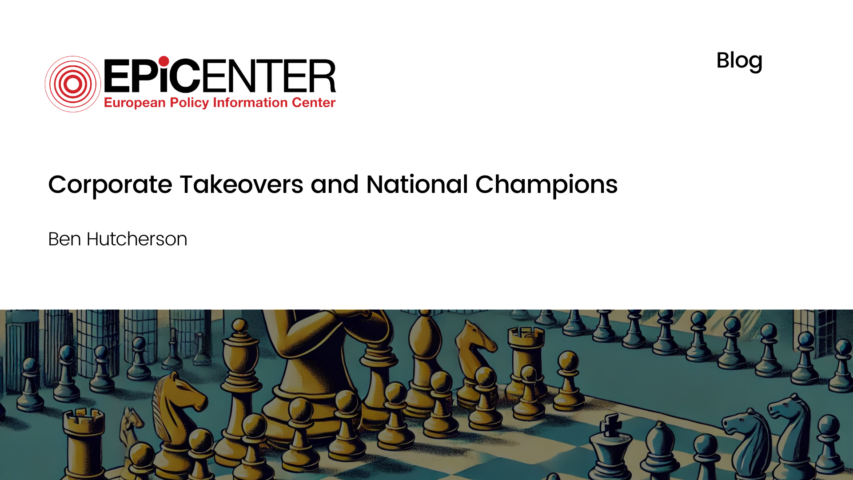Corporate Takeovers and National Champions

Corporate Takeovers and National Champions
Ben Hutcherson // 24 May 2019
In April, the UK’s Competition and Markets Authority (CMA) blocked the proposed £7Bn merger of supermarket chains ASDA and Sainsbury’s. This decision came shortly after the European Commission blocked the €15Bn merger of railway companies Siemens and Alstom in February. A recent British Government proposal further reflects the anti-takeover sentiment that is becoming prevalent in Europe. The proposal would increase the state’s power to intervene in takeovers of British companies, where it expects to increase the number of blocked takeovers from just a handful to around 50 per year. On a similar note, the German government recently proposed creating a fund to counter foreign takeovers, whilst simultaneously fighting to create German “National Champions” themselves.
These protectionist proposals not only represent a step towards a centrally planned economy, but also present the opportunity for future governments to block takeovers for political reasons. A perfect example of this was the UK Labour Party vehemently opposing Melrose’s hostile takeover of the under-performing 260-year old UK engineering firm GKN. Melrose, the so called “asset stripper”, came with a proposal of selling non-core and underperforming assets to improve operational efficiency, which could benefit the company itself and the wider economy. Contrary to popular belief, capital doesn’t simply disappear into the pockets of greedy investors when investment is reduced, or assets are sold. Capital is only withdrawn from a business if investors believe it can be better utilised elsewhere, and as a result, opposing this market-based allocation of capital can only lead to sub-optimal outcomes.
A growing form of nationalistic government intervention in Europe is the idea of creating “National Champions”. The first issue with creating national champions is who actually picks the future national champions? It is doubtful that policy makers are better at allocating capital than the collective wisdom of markets, and as a result this form of market intervention will likely lead to an inefficient use of a nation’s capital. Furthermore, if a good can be produced at a lower cost by a foreign entity, there is no reason to try and create a national champion to compete with them when it is viable to purchase directly from the foreign company. Lastly, perhaps the greatest cost of government backed national champions is the stifling of competition and reduction in innovation. When firms are in direct competition, they are continually striving to innovate to gain an advantage over their competitors. When a government-backed national champion monopolises a sector, this innovation is lost as the national champion becomes complacent and lacks the incentive to innovate.
Whilst the idea of government backed “National Champions” has the tendency to create monopolies, somewhat ironically, the goal of protecting competition is far too regularly used to block private sector mergers. When the CMA and the EU Commission blocked the mergers of ASDA and Sainsbury’s and Siemens and Alstom, they both argued that the mergers would harm competition. Whilst in the short-run it may be possible for these firms to raise prices and earn economic-profits, these abnormal profits will generally be eliminated in the long-run. Without government protection, it is difficult for a company to establish a long-run monopoly. If they raise prices too far above marginal costs, new entrants or existing competitors will undercut their prices and win business, no matter how large the aspiring monopolist may be. It is therefore not ordinarily necessary for the government to intervene to protect competition. Lastly, blocking such mergers as previously discussed causes companies, and by extension society, to lose out on the economies of scale other benefits that these mergers would create.
However, there can be legitimate reasons for blocking mergers or takeovers; in the interest of national security. This being said, there should be strict criteria to be met in order to classify a takeover as a national security threat. In the absence of such criteria, national security could become a veil for disguising politically motivated intervention. Protecting highly sensitive assets from foreign ownership is sometimes necessary, but the proposals need to be examined in great detail to ensure they are not a mechanism for state overreach. The UK government’s plans to examine 200 takeovers a year and block up to 50 is clear cause for concern.
The EU and member state governments should neither attempt to create “National Champions” nor unnecessarily intervene to block takeovers in the interest of competition. In the absence of national security risks market forces remain the most efficient means of allocating capital and fostering competition. It is the EU’s duty to maintain and promote globally the free movement of capital as this is beneficial for all member states and union citizens.
EPICENTER publications and contributions from our member think tanks are designed to promote the discussion of economic issues and the role of markets in solving economic and social problems. As with all EPICENTER publications, the views expressed here are those of the author and not EPICENTER or its member think tanks (which have no corporate view).



